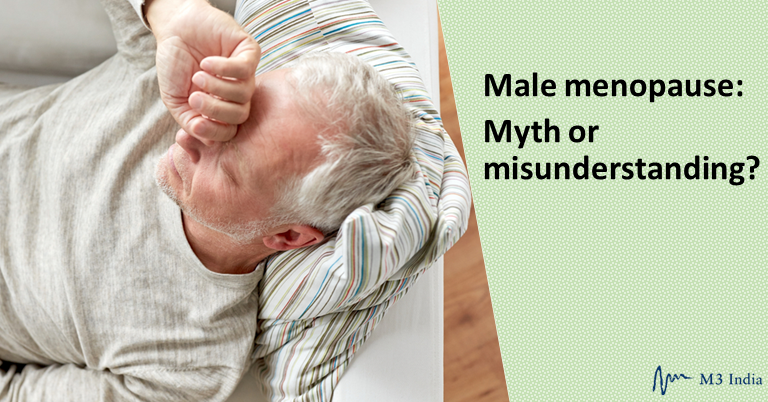Male menopause: Myth or misunderstanding?
M3 Global Newsdesk Jul 06, 2019
Something seems to happen to men as they go through middle age. They may feel depressed, lack energy, lose motivation, put on weight, or feel like they’re in a brain fog. So, does this mean that male menopause is a real thing?

Nope, it doesn’t. At least, not in the sense that you might be thinking. In women, menopause presents as a series of unilateral, milestone events:
- Women's production of estrogen drops rapidly, starting around age 40
- Their production of eggs stops completely
- And they will be unable to become pregnant
In contrast, men go through less significant and less noticeable changes:
- Their production of testosterone decreases gradually—about 1% per year—beginning around age 30
- Nevertheless, they continue to produce sperm
- And most can father children even in old age (as long as all the moving parts are still in working order)
Another thing about “male menopause” that’s drastically different from true menopause: Not all men experience it. Some don’t have decreases in testosterone or sperm production at all. It can also vary greatly from man to man. Some men with measurably low levels of testosterone don’t have symptoms, and some men with normal testosterone levels for their age do report symptoms.
There isn’t even an official name for “male menopause.” (The most obvious one, menopause, was already taken.) It’s called everything from “andropause” and “late-onset hypogonadism” to “testosterone deficiency syndrome” and even “androgen decline in the aging male,” or ADAM(!).
Still, although it doesn’t affect men in the way that menopause affects women, some clinical manifestations do occur—even if it’s simply a decrease in levels of testosterone.
In addition to advancing age, low testosterone levels can occur due to certain medications, hormone disorders, radiation or chemotherapy treatment, testicular injury, genetic conditions, or chronic illness (such as clinical depression, diabetes, liver/kidney disease, obesity, and HIV/AIDS).
Signs and symptoms of low testosterone levels may include decreased libido, erectile dysfunction, sleep disturbances (insomnia or sleepiness), increased body fat, reduced muscle strength, decreased bone density, swollen or tender breasts, sadness or depression, lack of self-confidence, loss of concentration, and even (though quite rarely) hot flashes.
Only a blood test can diagnose low testosterone levels.
Treatment, such as testosterone replacement therapy, is controversial. While it may relieve signs and symptoms in some men, it may cause dangerous side effects in others—potentially heart attack and stroke (not to mention less dire side effects, such as high red blood cell count, acne, and enlarged breasts).
“We saw what happened when the medical field assumed that it was safe and healthy to ‘restore’ women’s pre-menopause estrogen levels with hormone replacement therapy [HRT]: a significant increase in the risk of breast cancer the longer women stayed on HRT. It took a major clinical study, the Women’s Health Initiative that enrolled more than 160,000 women, to learn that lesson,” wrote John Swartzberg, MD, chair of the editorial board, BerkeleyWellness.com and the UC Berkeley Wellness Letter, on HuffPost.com.
Dr. Swartzberg added: “No such data is available for men about testosterone replacement.”
The jury is still out on the risks of testosterone replacement therapy. Some researchers have found that it increases the risk of cardiovascular events while other researchers report that it reduces cardiovascular disease outcomes. A study by Harvard researchers found no clinical reason to prescribe testosterone replacement therapy to men over age 65 years who have normal or low-to-normal testosterone levels.
Importantly, though, men who feel they’re going through “male menopause” should indeed take it seriously and go see their doctor—because they may actually have another problem with similar symptoms, such as medication side effects, thyroid dysfunction, depression, excessive alcohol use, or obstructive sleep apnea.
This story is contributed by John Murphy and is a part of our Global Content Initiative, where we feature selected stories from our Global network which we believe would be most useful and informative to our doctor members.
-
Exclusive Write-ups & Webinars by KOLs
-
Daily Quiz by specialty
-
Paid Market Research Surveys
-
Case discussions, News & Journals' summaries